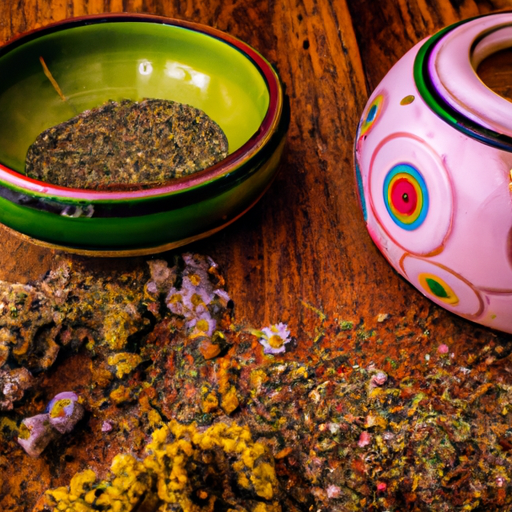More than 4 million Americans suffer from constipation regularly. If you are one of them, you understand how uncomfortable and frustrating it can be. Fortunately, there is a natural solution to relieve your symptoms and enhance your digestive health: herbal tea.
In this article, I will guide you through the best herbal teas for constipation, backed by evidence and centuries of traditional use. Herbal teas have been used for centuries to promote regular bowel movements and alleviate constipation. They work by stimulating the digestive system, relaxing the muscles in the intestines, and promoting the flow of waste through the body.
Not only are herbal teas effective, but they also offer a gentle and natural approach to relieving constipation without the side effects of medication. In this article, we will explore the top herbal teas for constipation, including chamomile, peppermint, ginger, dandelion root, senna, fennel, and licorice root teas.
Each of these teas has unique properties that can help alleviate constipation and promote overall digestive health. So, if you’re tired of dealing with the discomfort of constipation, keep reading to discover the best herbal tea that can bring you relief and improve your quality of life.
Key Takeaways
- Herbal teas such as chamomile, peppermint, ginger, and dandelion root can help relieve constipation.
- Senna and cascara sagrada herbs are powerful laxatives that stimulate bowel contractions.
- Chamomile tea not only relaxes muscles in the digestive tract but also reduces inflammation and promotes digestion.
- Licorice root tea can be effective for promoting regular bowel movements, but it should be consumed in moderation and under the guidance of a healthcare professional.
Chamomile Tea
If you’re looking for a herbal tea to relieve constipation, chamomile tea is an excellent choice for you. Chamomile is a popular herb known for its calming properties, but it also offers a range of health benefits. It can promote healthy digestion and alleviate constipation by relaxing the muscles in the digestive tract and reducing inflammation. This herb contains compounds that have anti-inflammatory and antispasmodic effects, which can help to soothe the stomach and relieve constipation.
In addition to its medicinal properties, chamomile tea is also a delicious and versatile beverage. You can enjoy it on its own or as part of a blend with other herbs, such as lavender or lemon balm, to enhance its flavor and therapeutic benefits. There are also many recipes available that incorporate chamomile tea, such as chamomile-infused honey or chamomile tea smoothies.
Now, let’s move on to the next herbal tea that can help with constipation: peppermint tea.
Peppermint Tea
Peppermint tea is known to soothe digestive discomfort and promote regularity. It’s been used for centuries as a natural remedy for various digestive issues, including constipation. The active compounds in peppermint, particularly menthol, have a calming effect on the muscles of the gastrointestinal tract. This helps relax and relieve any spasms that may be contributing to constipation.
Studies have shown that peppermint can increase the flow of bile, a substance that aids in the digestion and absorption of fats. This can help speed up the transit time of food through the digestive system, preventing constipation. Additionally, peppermint has antimicrobial properties, which can help maintain a healthy balance of bacteria in the gut.
To enjoy the benefits of peppermint tea for constipation, simply steep a few fresh or dried peppermint leaves in hot water for about 5 minutes. You can also add a squeeze of lemon or a teaspoon of honey to enhance the flavor. Peppermint tea can be enjoyed hot or cold, depending on your preference.
Peppermint tea is a natural and effective remedy for constipation. Its soothing properties and ability to promote regularity make it a great addition to your daily routine.
Next, let’s explore the benefits of ginger tea for constipation.
Ginger Tea
Ginger tea is a fantastic option for soothing the digestive system and improving bowel function. As someone who’s personally experienced its benefits, I can confidently say that ginger tea provides relief from digestive discomfort, reduces bloating, and helps regulate bowel movements.
The active compounds in ginger, such as gingerol, have been scientifically proven to have anti-inflammatory and antioxidant properties. This makes ginger tea a natural remedy for digestive issues.
Soothes the Digestive System
To soothe your digestive system, try sipping on a warm cup of chamomile tea, as it gently calms and eases any discomfort. Chamomile tea has long been praised for its numerous benefits for overall digestive health. It contains compounds that can help reduce inflammation in the digestive tract and promote the production of digestive enzymes, aiding in better digestion. Incorporating herbal tea into your daily routine can improve bowel function and prevent constipation. One way to do this is by replacing your morning coffee with a cup of herbal tea, such as peppermint or dandelion root, which can stimulate digestion and help move things along. These teas are not only delicious but also offer a natural remedy for constipation. Transitioning into the next section, let’s explore how herbal tea can effectively improve bowel function.
Improves Bowel Function
By incorporating herbal infusions into your daily routine, you’ll experience smoother digestion and an efficient bowel movement, creating a well-functioning digestive system.
To improve bowel function, consider making dietary changes such as increasing your fiber intake. Foods like fruits, vegetables, and whole grains can help regulate bowel movements by adding bulk to your stool. Additionally, staying hydrated is crucial for maintaining healthy digestion. Drinking plenty of water throughout the day can soften your stool and prevent constipation.
Lifestyle modifications can also promote regular bowel movements. Regular exercise stimulates the muscles in your intestines, promoting bowel regularity. Stress management techniques, such as deep breathing exercises or yoga, can help relax your digestive system and prevent constipation.
Incorporating these dietary and lifestyle changes can greatly improve your bowel function and promote a healthy digestive system.
Now, let’s discuss the benefits of dandelion root tea in the next section.
Dandelion Root Tea
If you’re looking for a natural remedy to relieve constipation, one herbal tea that you should definitely consider is dandelion root tea. Dandelion root has been used for centuries for its medicinal properties and is known for its numerous health benefits. Not only does it help improve bowel function, but it also aids in digestion and detoxification. Dandelion root contains compounds that stimulate the production of bile, which helps break down fats and promotes smooth bowel movements.
To make dandelion root tea, you can either use fresh or dried dandelion root. Simply boil a cup of water and add one teaspoon of dandelion root. Let it steep for about 10 minutes, then strain and enjoy. You can also add a touch of honey or lemon for added flavor.
Studies have shown that dandelion root tea can help relieve constipation by acting as a gentle laxative. It helps soften the stool and promotes regular bowel movements. However, it’s important to note that individual results may vary, and it’s always best to consult with a healthcare professional before starting any new herbal remedy.
Now, let’s move on to the next herbal tea that can help with constipation: senna tea.
Senna Tea
Senna tea is known for its powerful laxative effect and its ability to stimulate bowel contractions. It has been used for centuries as a natural herbal remedy to relieve constipation and promote regular bowel movements. By increasing the muscle contractions in the intestines, senna tea can help alleviate symptoms of constipation and improve overall digestive health.
Powerful Laxative Effect
Packed with potent herbs, this tea works wonders to relieve constipation and get things moving smoothly. Here are three reasons why it’s considered one of the best herbal teas for constipation:
-
Senna Leaf: This powerful herb contains compounds called anthraquinones, which stimulate the muscles in the intestines, promoting regular bowel movements. It’s a natural and effective remedy for constipation.
-
Cascara Sagrada: Another herb known for its laxative properties, cascara sagrada helps stimulate the bowel muscles and increase the frequency of bowel movements. It’s commonly used as a gentle and natural remedy for constipation.
-
Rhubarb Root: Rhubarb root has long been used as a traditional remedy for constipation. It contains compounds that help improve digestion and stimulate bowel contractions, aiding in the relief of constipation.
With its powerful combination of these herbs, this tea can effectively relieve constipation and promote healthy bowel movements.
Now, let’s explore how it stimulates bowel contractions.
Stimulates Bowel Contractions
The potent combination of these herbs in the tea works to get things moving smoothly, as it stimulates the muscles in the intestines and promotes regular bowel movements. One of the key benefits of herbal teas for constipation is their ability to stimulate bowel contractions. Certain herbs, such as senna and cascara sagrada, contain compounds that stimulate the muscles in the intestines, making them contract and move waste through the digestive system. This helps to relieve constipation and promote healthy digestion. Additionally, herbal teas often contain natural fiber, which adds bulk to the stool and further aids in regular bowel movements. One study found that herbal teas containing senna had a significant laxative effect compared to a placebo. Now, let’s move on to the next herbal tea for constipation: fennel tea.
Fennel Tea
Fennel tea is a herbal remedy that can effectively relieve bloating and gas. It contains compounds that help relax the muscles in the digestive tract, reducing discomfort and promoting better digestion.
Additionally, fennel tea has been known to promote smooth bowel movements by acting as a gentle laxative, helping to alleviate constipation.
Relieves Bloating and Gas
Feeling bloated and gassy? Sip on some soothing chamomile tea and watch as your discomfort melts away.
Chamomile tea has been used for centuries to relieve bloating and promote digestion. It contains compounds that help relax the muscles in your gastrointestinal tract, reducing bloating and easing gas. Chamomile tea also has anti-inflammatory properties that can help soothe irritated stomachs and relieve digestive discomfort. Additionally, it acts as a mild diuretic, which can help reduce water retention and bloating.
By promoting digestion and reducing bloating, chamomile tea can help you feel more comfortable and relieve the symptoms of constipation. So, why not give chamomile tea a try and see how it promotes smooth bowel movements?
Promotes Smooth Bowel Movements
Experience the gentle relief and improved digestive flow that chamomile tea can provide, as it effortlessly promotes smooth bowel movements. Chamomile tea is a popular herbal remedy known for its calming properties, but it also offers numerous benefits for digestion. This soothing tea has been used for centuries to alleviate constipation and improve overall digestion. The natural compounds found in chamomile, such as bisabolol and chamazulene, help relax the muscles in the digestive tract, allowing for easier passage of stool. Additionally, chamomile tea has anti-inflammatory properties that can reduce inflammation in the gut and relieve discomfort associated with constipation. By incorporating chamomile tea into your daily routine, you can enjoy a gentle and natural remedy for constipation while improving digestion. Now, let’s explore the benefits of licorice root tea.
Licorice Root Tea
To truly alleviate your constipation, you can’t go wrong with licorice root tea – it’s a game-changer! Licorice root has been used for centuries for its medicinal properties, and one of its key benefits is its ability to promote smooth bowel movements. This herbal tea contains compounds that act as natural laxatives, helping to stimulate the digestive system and relieve constipation.
Licorice root tea works by increasing the production of mucus in the intestines, which helps to soften the stool and make it easier to pass. It also has anti-inflammatory properties that can soothe the digestive tract and reduce any inflammation that may be contributing to constipation.
However, it’s important to note that licorice root tea should be consumed in moderation. While it’s generally safe for most people, excessive consumption can lead to side effects such as high blood pressure, low potassium levels, and fluid retention. If you have any pre-existing medical conditions or are taking medications, it’s always best to consult with a healthcare professional before adding licorice root tea to your routine.
Licorice root tea is a fantastic herbal remedy for constipation. Its natural laxative properties and soothing effects on the digestive system make it an effective and safe option for promoting regular bowel movements. Just remember to enjoy it in moderation and consult with a healthcare professional if you have any concerns.
Frequently Asked Questions
Can herbal teas be used as a long-term solution for constipation?
Yes, herbal teas can provide long-term benefits for constipation. While they may not be a complete solution, they can be used as an alternative option alongside other measures like dietary changes and exercise.
Are there any potential side effects of drinking herbal teas for constipation?
Potential side effects of drinking herbal teas for constipation include diarrhea, stomach cramps, and allergic reactions. While herbal teas may provide short-term relief, their long-term effectiveness as a solution for constipation is uncertain.
How should herbal teas be prepared for maximum effectiveness in relieving constipation?
To prepare herbal teas for maximum effectiveness in relieving constipation, it’s important to follow specific recipes designed for this purpose. These herbal tea recipes for constipation relief can help alleviate discomfort and promote healthy digestion.
Can pregnant women safely consume herbal teas to alleviate constipation?
Pregnant women can safely consume certain herbal teas to alleviate constipation. However, it is important to consult with a healthcare professional before doing so. It is also recommended to avoid herbal teas for constipation in children.
Are there any specific precautions or contraindications when using herbal teas for constipation in children?
When it comes to using herbal teas for constipation in children, it’s important to take precautions. While herbal teas can be effective, it’s crucial to consult with a healthcare professional for guidance and to ensure the safety of the child.
Conclusion
In conclusion, when it comes to choosing the best herbal tea for constipation, there are several options available. Chamomile tea is known for its soothing properties and can help relieve digestive issues. Peppermint tea is known to relax the muscles of the gastrointestinal tract, promoting healthy bowel movements. Ginger tea has been used for centuries to aid digestion and alleviate constipation. Dandelion root tea acts as a natural laxative and can help regulate bowel movements. Senna tea is a powerful herbal remedy for constipation, but should be used sparingly. Fennel tea can help relieve bloating and improve digestion. Licorice root tea has mild laxative effects and can help relieve constipation.
One interesting statistic to note is that according to a study published in the Journal of Ethnopharmacology, ginger has been shown to increase the frequency of bowel movements and improve stool consistency in individuals suffering from chronic constipation. This highlights the effectiveness of ginger tea as a natural remedy for constipation.










